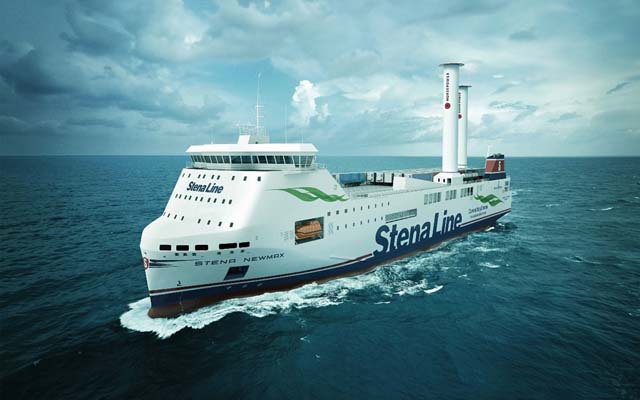Wind assisted propulsion systems (WAPS) developer Norsepower and Swedish shipowner Stena Line have signed an agreement for the delivery of two Norsepower rotor sails on a newbuild methanol hybrid ro-ro vessel.
This is in line with the Gothenburg-headquartered shipowner’s aim to cut CO2 emissions by 30% by 2030. Built by Jinling Weihai Shipyard in China, the 147m vessel will feature two 28m x 4m Norsepower Rotor Sails (NPRS), projected to deliver up to 9% fuel savings on the planned trade route. Scheduled for delivery to Stena Line from Stena RoRo in Q4 2025, the ship will operate on the Irish Sea, between Belfast and Heysham, where wind conditions are considered favourable for wind assisted propulsion.
According to Norsepower, this collaboration highlights the convergence of two industry leaders, both committed to innovation and sustainability. As a forward-thinking player in the maritime industry, Stena is known for rigorous specifications and high standards. Stena Line’s strategic ambition to transition to renewable fuels, including securing future e-methanol volumes, aligns with Norsepower’s mission to drive decarbonisation through wind propulsion technology.
Heikki Pöntynen, CEO Norsepower, said: “We are honoured to work with Stena Line, a company that has consistently led the way in sustainable shipping innovation. This partnership underscores the reliability and quality of Norsepower’s products, as well as its alignment with Stena Line’s forward-thinking goals to cut CO2 emissions by 30% by 2030.”
Dennis Tetzlaff, Fleet COO, Stena Line, added: “Stena Line recently launched our new ship, Stena Connecta, into the water and it will now be fitted out with two rotor sails. These sails will harness wind power to provide auxiliary propulsion to the vessel, therefore reducing fuel consumption and emissions. Innovations such as this are key to futureproofing our vessels and to reaching our emissions targets.”
The ro-ro vessel is said to represent a step forward in sustainable shipping, built to operate on methanol and is part of a broader initiative to integrate sustainable technologies. The sister vessel in the same series is being delivered ‘rotor sail ready’, further demonstrating Stena Line’s commitment to wind propulsion.
To minimise environmental impact during the project’s execution phase, the NPRS will be manufactured at Norsepower’s new production facility in Yancheng, China, and delivered directly to the shipyard. This approach reduces costs and emissions while exemplifying both companies’ dedication to sustainable operations.
Stena Line has a history of embracing innovation, becoming the first ferry operator to run a vessel on methanol with the conversion of Stena Germanica in 2015. The addition of NPRS further solidifies its position as an industry leader in decarbonisation.
Image: ‘Stena Connecta’ with rotor sails installed (source: Norsepower)



